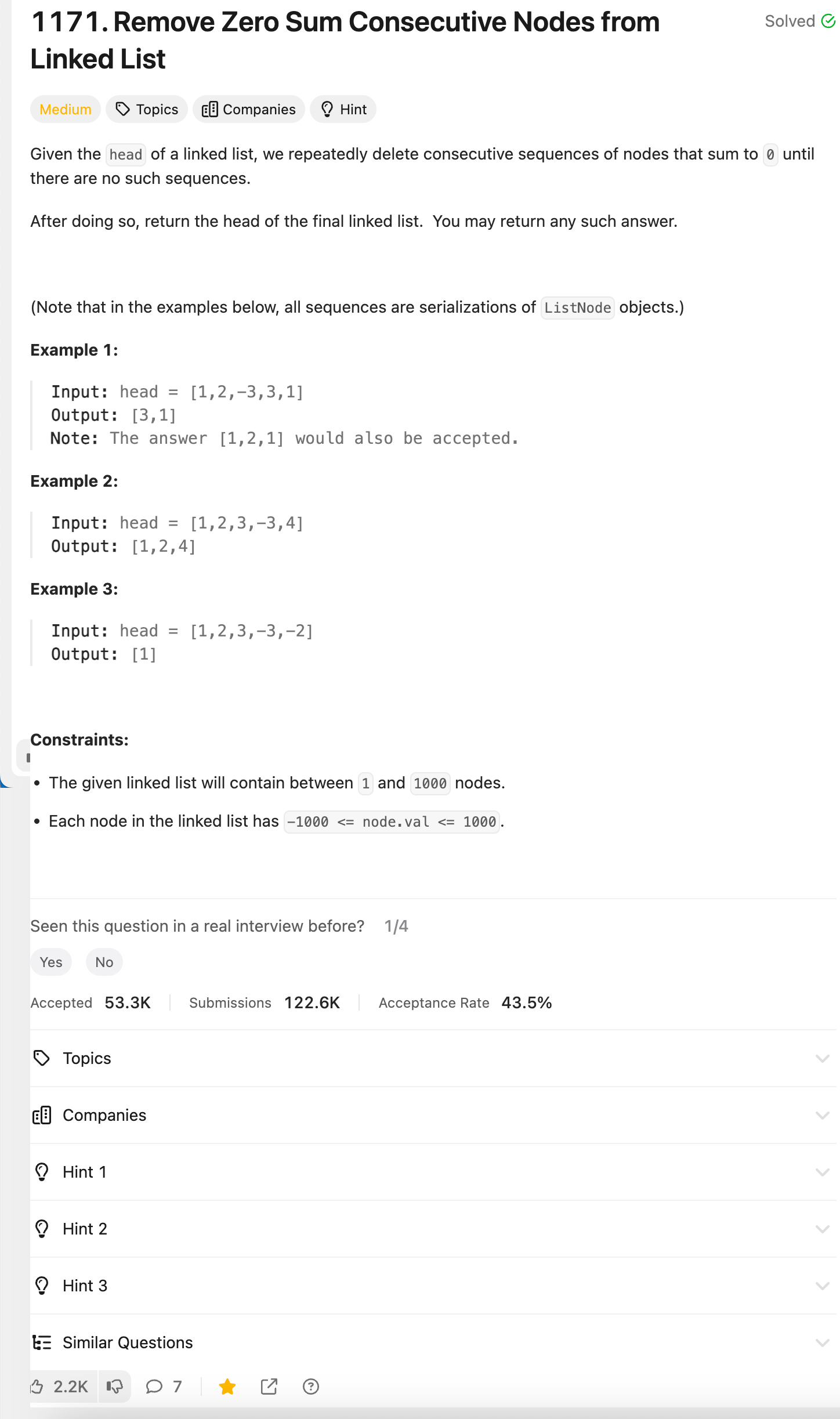Problem of The Day: Remove Zero Sum Consecutive Nodes from Linked List
Problem Statement
Intuition
The problem involves removing zero-sum sublists from a linked list. Use stack and hash set data structure to solve the problem.
Approach
I approach the problem by using a stack to maintain the running sum of nodes in the linked list along with the corresponding node. I also use a set (prefix_sum) to keep track of the unique running sums encountered. While iterating through the linked list, if the running sum is already in the set, I remove the subsequence with a zero sum. Finally, I connect the remaining nodes in the stack to form the modified linked list.
Complexity
-
Time complexity: O(n), where n is the number of nodes in the linked list. The algorithm iterates through the list once.
-
Space complexity: O(n), as the space required for the stack and set is proportional to the number of nodes in the linked list.
Code
# Definition for singly-linked list.
# class ListNode:
# def __init__(self, val=0, next=None):
# self.val = val
# self.next = next
class Solution:
def removeZeroSumSublists(self, head: Optional[ListNode]) -> Optional[ListNode]:
dummy = ListNode(-1)
stack = [[dummy, 0]]
curr = head
prefix_sum = {0}
while curr:
_, total = stack[-1]
total += curr.val
if total in prefix_sum:
seen = total
while stack and stack[-1][1] != seen:
_, total = stack.pop()
prefix_sum.remove(total)
else:
stack.append([curr, total])
prefix_sum.add(total)
curr = curr.next
for i in range(len(stack) - 1):
stack[i][0].next = stack[i + 1][0]
stack[-1][0].next = None
return stack[0][0].next
Editorial Solution
Approach 1: Prefix Sum for Each Consecutive Sequence
class Solution:
def removeZeroSumSublists(self, head: Optional[ListNode]) -> Optional[ListNode]:
front = ListNode(0, head)
start = front
while start is not None:
prefix_sum = 0
end = start.next
while end is not None:
# Add end's value to the prefix sum
prefix_sum += end.val
# Delete zero sum consecutive sequence
# by setting node before sequence to node after
if prefix_sum == 0:
start.next = end.next
end = end.next
start = start.next
return front.next
- Time complexity: O(n^2)
- Space complexity: O(1)
Approach 2: Prefix Sum Hash Table
implementation visited each node in the linked list twice
class Solution:
def removeZeroSumSublists(self, head: Optional[ListNode]) -> Optional[ListNode]:
front = ListNode(0, head)
current = front
prefix_sum = 0
prefix_sum_to_node = {0: front}
# Calculate the prefix sum for each node and add to the hashmap
# Duplicate prefix sum values will be replaced
while current is not None:
prefix_sum += current.val
prefix_sum_to_node[prefix_sum] = current
current = current.next
# Reset prefix sum and current
prefix_sum = 0
current = front
# Delete zero sum consecutive sequences
# by setting node before sequence to node after
while current is not None:
prefix_sum += current.val
current.next = prefix_sum_to_node[prefix_sum].next
current = current.next
return front.next
Improved implementation
class Solution:
def removeZeroSumSublists(self, head: Optional[ListNode]) -> Optional[ListNode]:
front = ListNode(0, head)
current = front
prefix_sum = 0
prefix_sum_to_node = {}
while current is not None:
# Add current's value to the prefix sum
prefix_sum += current.val
# If prefix_sum is already in the hashmap,
# we have found a zero-sum sequence:
if prefix_sum in prefix_sum_to_node:
prev = prefix_sum_to_node[prefix_sum]
current = prev.next
# Delete zero sum nodes from hashmap
# to prevent incorrect deletions from linked list
p = prefix_sum + current.val
while p != prefix_sum:
del prefix_sum_to_node[p]
current = current.next
p += current.val
# Make connection from the node before
# the zero sum sequence to the node after
prev.next = current.next
else:
# Add new prefix_sum to hashmap
prefix_sum_to_node[prefix_sum] = current
# Progress to next element in list
current = current.next
return front.next
- Time complexity: O(n)
- Space complexity: O(n)
